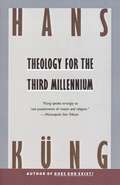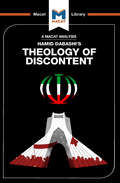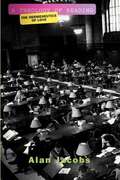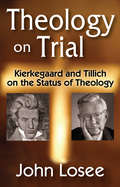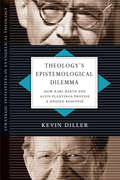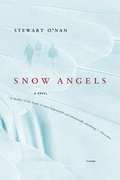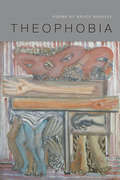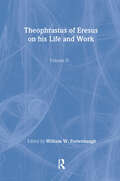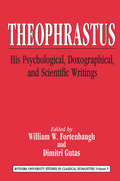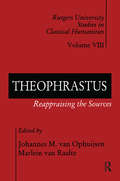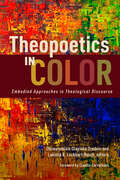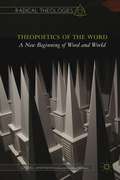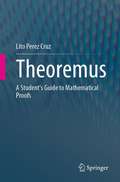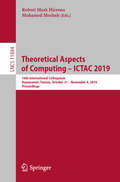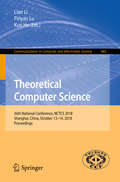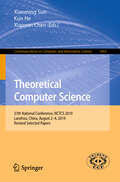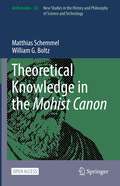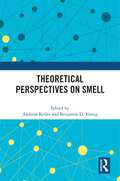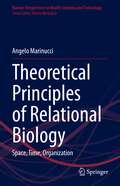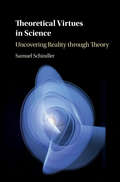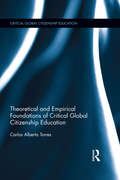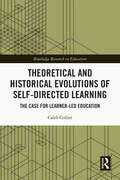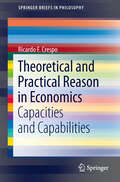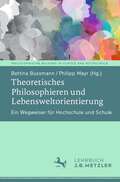- Table View
- List View
Theology for the Third Millennium: An Ecumenical View
by Hans KungThis illuminating historical and theological argument is an essential work for anyone wishing to understand the major changes that are inexorably altering the face of modern world religions.
Theology of Discontent: The Ideological Foundation of the Islamic Revolution in Iran
by Bryan Gibson Magdalena C. DelgadoHamid Dabashi’s 1997 work Theology of Discontent reveals a creative thinker capable not only of understanding how an argument is built, but also of redefining old issues in new ways. The Iranian Revolution of 1978–9 was front-page news in the West, and in some ways remains so today. Though it was an uprising against authoritarian royal rule, with a coalition of modernisers and Islamists, the revolution saw the birth of a new Islamic Republic that seemed to reject pro-Western democracy. Dabashi wanted to analyze the real reasons for this change, while examining how Islamic ideologies contributed to the revolution and the republic that followed. Theology of Discontent examines different Islamic thinkers, analyzing how views with seemingly little in common contributed to the modern Iranian belief system. Beyond its insightful analytical dissection of these eight thinkers, Theology of Discontent also shows Dabashi’s creative thinking skills. Reframing the debates about Iran’s relationship with the West, he traced the ways in which Iranian identity formed in reactive opposition to Western ideas. In many ways, Dabashi suggested, Iran was trapped in a cycle of deliberately asserting its difference from the West, a process that was fundamental to the development of its own unique brand of revolutionary Islamism.
Theology of Reading: The Hermeneutics of Love
by Alan JacobsIf the whole of the Christian life is to be governed by the "law of love"-the twofold love of God and one's neighbor-what might it mean to read lovingly? That is the question that drives this unique book. Jacobs pursues this challenging task by alternating largely theoretical, theological chapters-drawing above all on Augustine and Mikhail Bakhtin-with interludes that investigate particular readers (some real, some fictional) in the act of reading. Among the authors considered are Shakespeare, Cervantes, Nabakov, Nicholson Baker, George Eliot, W. H. Auden, and Dickens. The theoretical framework is elaborated in the main chapters, while various counterfeits of or substitutes for genuinely charitable interpretation are considered in the interludes, which progressively close in on that rare creature, the loving reader. Through this doubled method of investigation, Jacobs tries to show how difficult it is to read charitably-even should one wish to, which, of course, few of us do. And precisely because the prospect of reading in such a manner is so offputting, one of the covert goals of the book is to make it seem both more plausible and more attractive.
Theology on Trial: Kierkegaard and Tillich on the Status of Theology
by John LoseeSoren Kierkegaard sought to clarify what it means to be a Christian. He concluded that a one-on-one relationship with God is required, to encounter the "Absolute Paradox," defined as an immutable being entering into and transforming human history. Kierkegaard's dim view of a systematic Christian theology includes a preoccupation with theological exposition that distracts from the essential task of achieving a personal relationship with Jesus Christ. Alternatively, Paul Tillich's theology is based on a triadic relationship of being, nonbeing and Being-Itself (God), a doctrine of symbols, and a reinterpretation of the Incarnation. It correlates a culture's questions and concerns with the Christian message to certain criteria of acceptability that, to Tillich, must satisfy the "Protestant Principle," stipulating that a theological system both restates the present-time Christian message and acknowledges that this restatement cannot be the definitive, ultimate expression of that message. Theology on Trial presents and assesses whether, and to what degree, Tillich's theology satisfies his own criteria of acceptability. An acceptable theology must be logically consistent and free of equivocation. The concluding section of the book examines the views of each author from the standpoint of the other.
Theology's Epistemological Dilemma: How Karl Barth and Alvin Plantinga Provide a Unified Response (Strategic Initiatives in Evangelical Theology)
by Kevin DillertruthTheology's Epistemological Dilemma
Theophilos: A Novel
by Michael O'Brien"St. Luke addressed his Gospel and the Acts of the Apostles to a man named Theophilos. Who was Theophilos? Scripture scholars do not know, making him a fit subject for Michael O'Brien's vivid imagination. In this fictional narrative, Theophilos is the skeptical but beloved adoptive father of St. Luke. Challenged by the startling account of the 'Christos' received in the chronicle from his beloved son Luke, and concerned for the newly zealous young man's fate, Theophilos, a Greek physician and an agnostic, embarks on a search for Luke to bring him home. He is gravely concerned about the 'illusions ' to which Luke has succumbed regarding the incredible stories surrounding Jesus of Nazareth, a man who has caused so much controversy throughout the Roman Empire. Thus begins a long journey that will take Theophilos deep into the war between nations and empires, truth and myth, good and evil, and into unexpected dimensions of his very self. His quest takes the reader into three ancient civilizations--Greek, Roman, Jewish--as well as into early Christianity, where he meets those who knew this man that some believe is the Messiah. Though Theophilos is a man of the past ages, he is as familiar to us as the men of our own times. Schooled in the empiricism of both medicine and philosophy, Theophilos is well suited to speak to our age in which seeing cannot be the basis for faith, but rather hearing the witness of those who have been touched by God and opening ourselves to the possibility of an encounter with the living Christ. This is a story about the mysterious interaction of faith and reason, the psychology of perception, and the power of love over death."
Theophobia
by Bruce BeasleyTheophobia is the latest volume in Bruce Beasley's ongoing spiritual meditation which forms a kind of postmodern devotional poetry in a reinvention of the tradition of John Donne, George Herbert, Emily Dickinson, Gerard Manley Hopkins, and T. S. Eliot. Theophobia is structured around a series of poems called "Pilgrim's Deviations" and forms a deviant and deviating pilgrimage through science, history, politics, and popular culture. Beasley seeks the Biblical Kingdom of God among Dolly the cloned sheep, the wonders and horrors of extremophilic creatures living in astonishing intensities of temperature, robotic phone operators, and Wikipedia's explanation of the mysteries of the Holy Spirit. Bruce Beasley is the author of six poetry collections, most recently The Corpse Flower: New and Selected Poems (University of Washington Press, 2007). He has won fellowships from the NEA and the Artist Trust of Washington and three Pushcart Prizes.
Theophobia (American Poets Continuum #136.00)
by Bruce BeasleyTheophobia is the latest volume in Bruce Beasley's ongoing spiritual meditation which forms a kind of postmodern devotional poetry in a reinvention of the tradition of John Donne, George Herbert, Emily Dickinson, Gerard Manley Hopkins, and T. S. Eliot. Theophobia is structured around a series of poems called "Pilgrim's Deviations" and forms a deviant and deviating pilgrimage through science, history, politics, and popular culture. Beasley seeks the Biblical Kingdom of God among Dolly the cloned sheep, the wonders and horrors of extremophilic creatures living in astonishing intensities of temperature, robotic phone operators, and Wikipedia's explanation of the mysteries of the Holy Spirit. Bruce Beasley is the author of six poetry collections, most recently The Corpse Flower: New and Selected Poems (University of Washington Press, 2007). He has won fellowships from the NEA and the Artist Trust of Washington and three Pushcart Prizes.
Theophrastus of Eresus: On His Life and Work
by William FortenbaughThis series in the field of classics grew out of Project Theophrastus, an international undertaking whose goal is to collect, edit, and comment on the fragments of Theophrastus, Greek philosopher, Aristotle's pupil and second head of the Peripatetic School. Contributions are by international experts, and each volume will have a particular focus. Volume I is devoted to Arius Didymus, court philosopher to Caesar Augustus and author of an extensive survey of Stoic and Peripatetic ethics. Volumes II and III will concentrate on Theophrastus and disseminate knowledge gained through work on the project. Volume IV will focus on Cicero and his knowledge of Hellenistic philosophy.
Theophrastus: His Psychological, Doxographical, and Scientific Writings (Rutgers University Studies in Classical Humanities)
by William FortenbaughTheophrastus of Eresus was Aristotle's pupil and successor as head of the Peripatetic School. He is best known as the author of the amusing Characters and two ground-breaking works in botany, but his writings extend over the entire range of Hellenistic philosophic studies. Volume 5 of Rutgers University Studies in Classical Humanities focuses on his scientific work. The volume contains new editions of two brief scientific essays-On Fish and Afeteoro/o^y-accompanied by translations and commentary.Among the contributions are: "Peripatetic Dialectic in the De sensibus," Han Baltussen; "Empedocles" Theory of Vision and Theophrastus' De sensibus," David N. Sedley; "Theophrastus on the Intellect," Daniel Devereux; "Theophrastus and Aristotle on Animal Intelligence," Eve Browning Cole; "Physikai doxai and Problemata physika from Aristotle to Agtius (and Beyond)," Jap Mansfield; "Xenophanes or Theophrastus? An Aetian Doxographicum on the Sun," David Runia; "Place1 in Context: On Theophrastus, Fr. 21 and 22 Wimmer," Keimpe Algra; "The Meteorology of Theophrastus in Syriac and Arabic Translation," Hans Daiber; "Theophrastus' Meteorology, Aristotle and Posidonius," Ian G. Kidd; "The Authorship and Sources of the Peri Semeion Ascribed to Theophrastus," Patrick Cronin; "Theophrastus, On Fish" Robert W. Sharpies.
Theophrastus: Reappraising the Sources (Rutgers University Studies In Classical Humanities Ser. #Vol. 8)
by Johannes M. van OphuijsenTheophrastus was Aristotle's pupil and second head of the Peripatetic School. Apart from two botanical works, a collection of character sketches, and several scientific opuscula, his works survive only through quotations and reports in secondary sources. Recently these quotations and reports have been collected and published, thereby making the thought of Theophrastus accessible to a wide audience. The present volume contains seventeen responses to this material.There are chapters dealing with Theophrastus' views on logic, physics, biology, ethics, politics, rhetoric, and music, as well as the life of Theophrastus. Together these writings throw considerable light on fundamental questions concerning the development and importance of the Peripatos in the early Hellenistic period. The authors consider whether Theophrastus was a systematic thinker who imposed coherence and consistency on a growing body of knowledge, or a problem-oriented thinker who foreshadowed the dissolution of Peripatetic thought into various loosely connected disciplines. Of special interest are those essays which deal with Theophrastus' intellectual position in relation to the lively philosophic scene occupied by such contemporaries as Zeno, the founder of the Stoa, and Epicurus, the founder of the Garden, as well as Xenocrates and Polemon hi the Academy, and Theophrastus' fellow Peripatetics, Eudemus and Strato.The contributors to the volume are Suzanne Amigues, Antonio Battegazzore, Tiziano Dorandi, Woldemar Gorier, John Glucker, Hans Gottschalk, Frans de Haas, Andre Laks, Anthony Long, Jorgen Mejer, Mario Mignucci, Trevor Saunders, Dirk Schenkeveld, David Sedley, Robert Sharpies, C. M. J. Sicking and Richard Sorabji. The Rutgers University Studies in Classical Humanities series is a forum for seminal thinking in the field of philosophy, and this volume is no exception. Theophrastus is a landmark achievement in intellectual thought. Philosophers, historians, and classicists will all find this work to be enlightening.
Theopoetics in Color: Embodied Approaches in Theological Discourse
by Oluwatomisin Olayinka Oredein and Lakisha R. Lockhart-RuschA collaborative book project centering the liberative theopoetics practiced by a new generation of scholars of color What is theopoetics? Once a field dominated by white liberals in the ivory tower, this embodied form of theology has flourished in the work of a new generation of scholars of color. In this groundbreaking book edited by Oluwatomisin Olayinka Oredein and Lakisha R. Lockhart-Rusch, a diverse team of theologians shows how theopoetics can be practiced &“in color.&” Featuring unconventional and artistic forms of religious reflection, this collection demonstrates how theology can become accessible when it reflects the embodied experiences of marginalized people and communities. These creative contributions defy the limitations of the white, Eurocentric academy, including such works as: • an explanation on the use of experimental theater to express theological theses • a guide to spiritual disciplines for metaphorical cyborgs seeking liberation • a meditation on the theological import of Filipino potlucks • a literary reflection on the meaning of religion to Black boys and men Diverse in scope and radical in perspective, this bold volume reclaims the liberative potential of theopoetics. Scholars and students of theology and the arts will discover inspiring new methodologies and fresh ideas in these pages. Contributors: Brian Bantum, Yara González-Justiniano, James Howard Hill Jr., Carolina Hinojosa-Cisneros, Yohana Agra Junker, Peace Pyunghwa Lee, Lakisha R. Lockhart-Rusch, Oluwatomisin Olayinka Oredein, Patrick B. Reyes, Joyce del Rosario, Tiffany U. Trent, Tamisha A. Tyler, Lis Valle-Ruiz
Theopoetics of the Word
by Gabriel VahanianGabriel Vahanian's final work, Theopoetics of the Word weaves together Christian theology, continental philosophy and cultural studies to present a new theology of language and technology for the 21st century.
Theoremus: A Student's Guide to Mathematical Proofs
by Lito Perez CruzA compact and easily accessible book, it guides the reader in unravelling the apparent mysteries found in doing mathematical proofs. Simply written, it introduces the art and science of proving mathematical theorems and propositions and equips students with the skill required to tackle the task of proving mathematical assertions. Theoremus - A Student's Guide to Mathematical Proofs is divided into two parts. Part 1 provides a grounding in the notion of mathematical assertions, arguments and fallacies and Part 2, presents lessons learned in action by applying them into the study of logic itself. The book supplies plenty of examples and figures, gives some historical background on personalities that gave rise to the topic and provides reflective problems to try and solve. The author aims to provide the reader with the confidence to take a deep dive into some more advanced work in mathematics or logic.
Theoretical Aspects of Computing – ICTAC 2019: 16th International Colloquium, Hammamet, Tunisia, October 31 – November 4, 2019, Proceedings (Lecture Notes in Computer Science #11884)
by Mohamed Mosbah Robert Mark HieronsThis book constitutes the refereed proceedings of the 16th International Colloquium on Theoretical Aspects of Computing, ICTAC 2019, held in Hammamet, Tunisia, in October/November 2019.The 17 revised full papers presented together with 2 keynote papers and 1 industrial paper were carefully reviewed and selected from 138 submissions.The papers are grouped in topical sections on models and transition systems; real-time and temporal logics; verification and concurrency; privacy and security; equations, types, and programming languages.
Theoretical Computer Science: 36th National Conference, NCTCS 2018, Shanghai, China, October 13–14, 2018, Proceedings (Communications in Computer and Information Science #882)
by Lian Li Kun He Pinyan LuThis book constitutes the thoroughly refereed proceedings of the National Conference of Theoretical Computer Science, NCTCS 2018, held in Shanghai, China, in October 2018. The 11 full papers presented were carefully reviewed and selected from 31 submissions. They present relevant trends of current research in the area of algorithms and complexity, software theory and method, data science and machine learning theory.
Theoretical Computer Science: 37th National Conference, NCTCS 2019, Lanzhou, China, August 2–4, 2019, Revised Selected Papers (Communications in Computer and Information Science #1069)
by Kun He Xiaoming Sun Xiaoyun ChenThis book constitutes the thoroughly refereed proceedings of the National Conference of Theoretical Computer Science, NCTCS 2019, held in Lanzhou, China, in August 2019. The 11 full papers presented were carefully reviewed and selected from 28 submissions. They present relevant trends of current research in the area of algorithms and complexity, data science and machine learning theory, and computational model.
Theoretical Knowledge in the Mohist Canon (Archimedes #63)
by Matthias Schemmel William G. BoltzThis open access book presents a new translation, interpretation and analysis of selected passages from the so-called Mohist Canon, a Chinese text from ca. 300 BCE, and discusses the role of the text in the world history of science, arguing that it represents an early emergence of theoretical, systematized knowledge that is independent from parallel developments in ancient Greece. It is aimed at historians of science, of knowledge and of philosophy, and generally at readers interested in these topics from an intercultural perspective and particularly with respect to China.
Theoretical Perspectives on Smell
by Andreas KellerTheoretical Perspective on Smell is the first collection of scholarly articles to be devoted exclusively to philosophical research on olfaction. The essays, published here for the first time, bring together leading theorists working on smell in a format that allows for deep engagement with the emerging field, while also providing those new to the philosophy of smell with a resource to begin their journey. The volume’s 14 chapters are organized into four parts: I. The Importance and Beauty of SmellII. Smell in Time and SpaceIII. What We Perceive through SmellIV. Smell and Other Senses The collection solidifies the area as an important emerging branch of perceptual philosophy by presenting the cutting edge research being done by innovative early career researchers, as well as by those more senior and established within the field.
Theoretical Principles of Relational Biology: Space, Time, Organization (Human Perspectives in Health Sciences and Technology #6)
by Angelo MarinucciThis book proposes the foundation of the relational approach to biology, rejecting the deterministic and reductionist approach of molecular biology. Although biology has made enormous progress in the last seventy years, onto genesis is still conceived as a “revelation” of information (DNA). Recovering the geometric tradition, relational biology conceives scientific and epistemological tools (cause, probability, space etc.) of science in a new way. If probabilistic biology and organicism still proposes a biology based on physics, with a fundamental invariant, relational biology is based on variation: its fundamental invariant is variation, one of the most important elements of life. This is an indispensable book for academics who consider biology from a new theoretical approach, in particular for those working in the domains of cancer, ontogenesis and evolution.
Theoretical Virtues in Science: Uncovering Reality Through Theory
by Samuel SchindlerWhat are the features of a good scientific theory? <P><P>Samuel Schindler's book revisits this classical question in the philosophy of science and develops new answers to it. Theoretical virtues matter not only for choosing theories 'to work with', but also for what we are justified in believing: only if the theories we possess are good ones (qua virtues) can we be confident that our theories' claims about nature are actually correct. Recent debates have focused rather narrowly on a theory's capacity to predict new phenomena successfully, but Schindler argues that the justification for this focus is thin. He discusses several other theory properties such as testability, accuracy, and consistency, and highlights the importance of simplicity and coherence. Using detailed historical case studies and careful philosophical analysis, Schindler challenges the received view of theoretical virtues and advances arguments for the view that science uncovers reality through theory.<P> Provides a detailed and comprehensive treatment of the features that characterize good scientific theories.<P> Puts forward four new arguments for scientific realism, advancing current debates.<P> Challenges the received view of theoretical virtues and addresses issues including demarcation and methodology.
Theoretical and Empirical Foundations of Critical Global Citizenship Education (Critical Global Citizenship Education)
by Carlos Alberto TorresIn the first volume in the Critical Global Citizenship Education series, Torres combines theoretical and empirical research to present an original perspective on global citizenship education as a vitally important way of learning in a globalized world. In examining the requirements for effective global citizenship education and education reform, he investigates pathways to citizenship-building at the local, national and global levels and urges development of teaching methods, teacher education, and curriculum within a social justice education framework. Taking into account post-colonial perspectives, political realities at play, and practical implications, Torres provides a succinct but comprehensive understanding of how global citizenship education can expand the concept of civic education in a global society and interrupt inequality. This volume considers the ways that global citizenship education has been incorporated and is used by international institutions, governments, and the academy, and provides a clear framework for anyone struggling to make sense of the tensions and complexities of global citizenship education today.
Theoretical and Historical Evolutions of Self-Directed Learning: The Case for Learner-Led Education (Routledge Research in Education)
by Caleb CollierThis book analyzes the deep historical and theoretical roots of self-directed learning models in order to put forward a new conceptual understanding of self-directed learning. It utilizes philosophical methods to present arguments, both historical and contemporary, in favor of shifting education toward self-directed models and away from a view of education that places teachers, administration, curriculum, and standards at the center of the learning endeavor. This book demonstrates that self-directed learning has proven to be effective in numerous contexts and builds on this history to present a new philosophy of education termed "Eudemonic Self-Directed Learning," for individual and societal flourishing. Exploring exemplars from different cultural and historical settings to inform post-pandemic pedagogies and policies, this book will appeal to scholars and researchers of the history and philosophy of education, with interests in self-directed learning and its potential for contemporary practice.
Theoretical and Practical Reason in Economics
by Ricardo F. CrespoThe aim of the book is to argue for the restoration of theoretical and practical reason to economics. It presents Nancy Cartwright and Amartya Sen's ideas as cases of this restoration and sees Aristotle as an influence on their thought. It looks at how we can use these ideas to develop a valuable understanding of practical reason for solving concrete problems in science and society. Cartwright's capacities are real causes of events. Sen's capabilities are the human person's freedoms or possibilities. They relate these concepts to Aristotelian concepts. This suggests that these concepts can be combined. Sen's capabilities are Cartwright's capacities in the human realm; capabilities are real causes of events in economic life. Institutions allow us to deliberate on and guide our decisions about capabilities, through the use of practical reason. Institutions thus embody practical reason and infuse certain predictability into economic action. The book presents a case study: the UNDP's HDI.
Theoretisches Philosophieren und Lebensweltorientierung: Ein Wegweiser für Hochschule und Schule (Philosophische Bildung in Schule und Hochschule)
by Philipp Mayr Bettina BussmannDie globalen Veränderungen fordern unser Wissen über die Welt und über uns selbst heraus. Der Klimawandel, die globale Covid-19-Pandemie und Konflikte um die Bedeutung wissenschaftlicher Erkenntnisse führen uns unweigerlich zu einer Vielzahl komplexer philosophischer Fragen. Dabei rücken verstärkt Themen der theoretischen Philosophie in den Vordergrund: Was ist eigentlich Wissen? Auf welche Informationen können wir uns verlassen? Ist die Wahrheit relativ? Was macht ExpertInnen aus? Was ist gute wissenschaftliche Praxis? Was bedeutet ‚evidenzbasiert‘? Welchen sozialen und globalen Einflüssen ist unser Wissenserwerb ausgesetzt? In der Ausbildung von Philosophie- und Ethikstudierenden gibt es oft eine große Scheu, Disziplinen wie Erkenntnistheorie und Wissenschaftsphilosophie zu erlernen und zu unterrichten. Zu abstrakt und lebensweltlich irrelevant, sagen viele. Dieses Buch soll diese Berührungsängste beseitigen helfen, indem die theoretischen Grundlagen auf die Probleme der Gegenwart angewendet und mit vielseitigen Methoden erschlossen werden. Zwei Ziele stehen im Vordergrund: Zum einen soll deutlich werden, dass die Beschäftigung mit theoretischer Philosophie für das persönliche und das gesellschaftliche Zusammenleben von zentraler Bedeutung ist. Zum anderen zeigen eine Reihe didaktischer Tools, wie man Lernende dabei aktiv in den Lernprozess miteinbezieht.
